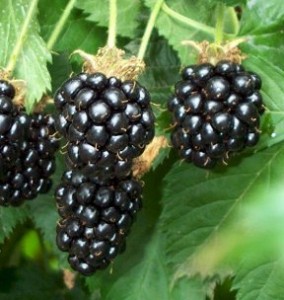There are lots of potential dangers in the berry patch. Sure, it looks and sounds peaceful enough…pastoral even. You can bring your kids with you and visit while picking a bucketful of juicy berries. What a nice, safe, productive, enjoyable way to spend some family time! And it’s true! The berry patch is all of that and more.
However, it is also full of potential hazards…hazards that are relatively easy to protect against if you take the time to prepare, but that can cause significant discomfort if not properly prepared for.
First, there are the thorns. Blackberries are protected by long, sharp, hooked thorns that seem to always find a way to prick, no matter how carefully avoided. Long sleeves, blue jeans and boots will greatly aid in reducing your number of pricks and scratches. They will also help you to be less timid in your pursuit of berries. Berry pickers who go to the patch attired in shorts, tank top and flip-flops invariably wind up skirting the edges of the berry patch, looking only for the berries within easy reach that don’t require any real effort. Sure, they’ll find a handful of easy-to-reach berries, but they’re not properly attired for pressing in to where the majority of the berries may be found. These unprepared pickers usually wind up eating the few berries they picked at the edge of the patch while the properly attired pickers finish filling their buckets.
Then, there is the sun. Blackberries like to grow in areas with lots of sunshine. So, while picking you will be exposed to direct sunlight most of the day. Fortunately, the same clothes that help protect from thorns also help protect from sunburn. However, you must still address any areas remaining uncovered. You should wear a hat or cap, to help keep the sun off of your face, and you should apply sunblock to the back of your neck, your ears, and any other exposed areas, to prevent sun burn.
Then there are the insects. Chiggers in particular seem to abound in areas around a blackberry patch, although there may also be ticks, mosquitoes or horse-flies. None of these is very difficult to avoid, but can seem downright unbearable if not planned for. Fortunately, the long sleeves, blue jeans and boots that protect against thorns and sun also make a good barrier against insects. However, a good overspray of insect repellant is a must to keep the chiggers out. Personally I recommend Deep Woods Off, or something similar.
Spray a light spray over all your clothes, then a very heavy spray around your waist line and ankles, where insects are likely to try to find a way past your protective clothing. Finally, apply a light spray over your exposed face and back of your neck. This final spray is easiest done with someone else’s assistance. Be sure to close and cover your eyes and hold your breath while your assistance lightly sprays your facial area.
Finally, there is the heat and dehydration to be concerned about. Early morning is the best time for picking, before the full heat of the day. However, plan to potentially be out in the heat for an extended period. Carry plenty of Gatorade and water, and be quick to use them. Although heat is uncomfortable, it is seldom truly dangerous so long as you keep your fluid levels up. However, dehydration can come quickly and is potentially fatal, if you fail to replace expended fluids.
Life Application
Many things in life require proper preparation and planning. In fact, life itself requires preparation. The whole purpose of childhood is to provide for a child’s protection and provision until the child has matured enough to be prepared to protect and provide for himself.
Likewise, education is preparation for future ability to perform in a career or trade, in order to be able to care and provide for oneself and one’s family.
The same is true of the Christian life. Too often, we view the Christian life as simply a matter of faith and forget the faith must be put into practice, much less that we must make appropriate preparations.
In Ephesians 6:10-11, the Apostle Paul tells us, “Finally, be strong in the Lord, and in the strength of His might. Put on the full armor of God, that you may be able to stand firm against the schemes of the devil.”
Paul is telling us that the Christian walk is full of hazards, and that we must make sure we are properly prepared. If we are not properly prepared and attired we will be ineffective and exposed. Like the berry pickers who circle the edges of the berry patch selecting a handful of easily picked berries, if we are not prepared for the Christian life, we will skirt the edges picking up a few encouraging motivational ideas, but will fail to fully embrace the Christian life with our complete enthusiastic trust. As a result, we will not see the life-changing heart-molding blessings that the Father has prepared for us.
Worse, we may fall prey to “the schemes of the devil.” Like the berry patch, the Christian walk appears very idyllic and pastoral, where we walk with Jesus and all of our cares are provided for. And that is all true. However, it is also true that the Christian walk is full of hazards which are dangerous, potentially fatal even, to those who are unprepared.
In Luke 8:5-15, Jesus tells the parable of the sower and the seed. In this parable, Jesus describes three ways that the Word of God may be ineffective in a person’s life, and only one way in which it is effective. The difference between the effective and the
ineffective is the preparation of the soil.
In the passage in Ephesians 6:10-18, Paul goes on to discuss the Christian walk in terms of warfare, telling us “Put on the full armor of God,” and providing detailed instructions on how to prepare for battle:
“Therefore, take up the full armor of God, so that you will be able to resist in the evil day, and having done everything, to stand firm. Stand firm therefore, having girded your loins with truth, and having put on the breastplate of righteousness, and having shod your feet with the preparation of the gospel of peace, in addition to all, taking up the shield of faith with which you will be able to extinguish all the flaming arrows of the evil one. And take the helmet of salvation, and the sword of the spirit, which is the word of God” (Ephesians 6:13-17).
Having detailed the protective equipment necessary for daily spiritual warfare, Paul goes on to emphasize the need for constant prayer, “With all prayer and petition pray at all times in the Spirit…” (Ephesians 6:18). Prayer is our access to Christ, the Living Water. Just as we must constantly consume fluids to stay hydrated in the heat of the berry patch, as we go about our daily business in this world full of hazards, we must
constantly replenish our reliance on God, through prayer and Bible reading.
So, before you enter the berry patch, today, first make sure you are prepared.
Put on the full armor of God. Fill up on the word of God. Then carry Christ with you, praying constantly for replenishment of His life-giving essence.
Questions
(please add your comments to this post):
What examples do you have, from your own life experiences of times where being prepared allowed you to be more effective in glorifying Christ?
What examples do you have of times when being poorly prepared resulted in loss of effectiveness?
In what area of your life have you been skirting around the perimeter of the berry patch, avoiding wholeheartedly plunging in to deeper commitment and greater effectiveness? What is keeping you from a deeper commitment? What can you do, today, to either take the next step deeper into the berry patch, or to prepare for taking the next step?


